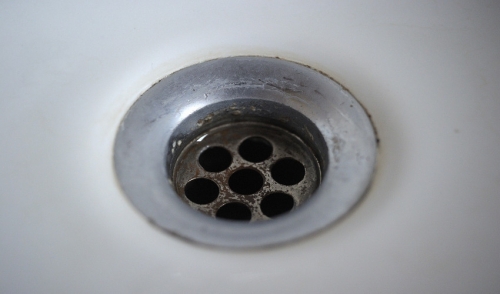{article.name}
Tips on How to Prevent Clogged Drains

- Share this:
- Share on Facebook
- Pin on Pinterest
- Tweet on Twitter
Probably the most common home plumbing issue is the clogged drain. For many, the initial reaction is to grab the closest chemical drain cleaner, pour it in, and all is once again right with the world. The fact is, though drain cleaners may punch a hole through the clogged area, this doesn’t necessarily mean the problem has completely gone away. In fact, because much of the material may still be present, the clog could easily reoccur -thus requiring more chemical. The real issue occurs when the repeated use of these highly caustic chemicals eventually wears down the inner wall of drainpipes, causing leaks and more problems. The best fix in this case would be to bite the bullet and call a plumber to have the drain properly cleaned out with a snake.
Having said all that, how do you avoid clogged drains in the first place? It’s easier than you think and can be done with minimal effort.
Firstly, be mindful of what goes down the drain. For kitchens, things like fats, grease and oils can easily cling to the interior of pipes as they cool. Over time, this build-up restricts the opening and creates a soft, sticky surface for other debris to stick to. Consider starting a compost project as an alternative means of disposing of many food debris, oils and coffee grounds that would normally find their way down the kitchen drain. For bathrooms, make sure that the only thing that goes down through the toilet is --well, the obvious, and toilet paper. Other things, like paper towels, sanitary napkins, cotton balls, or Q-tips and such, will not break down in water and can easily clog up the waterworks. For showers and sinks, prevent hair from making it into the drain by keeping in place or installing a screen/strainer. It’s much easier to remove the hair before it makes it into the drain.
Next, take steps to ensure that your drains remain clean. This can be as simple as pouring a gallon of hot or boiling water down the drain every month or so. This will help loosen up any material that may have found its way down and help it to continue along. To finish, run hot tap water for 5 to 10 minutes behind the boiling water to help push everything down as far as possible. Another step, which will also help prevent odors, is pouring baking soda down each drain every couple of months. The baking soda will also help prevent the buildup of fatty deposits. For even more kick, pour some vinegar in after the baking soda. Allow it to foam and fizz for about a minute and run about a gallon of hot water down the drain after. This is best done at the end of the day, allowing the concoction to do its work overnight.
By following these simple preventative measures, the likelihood of a clogged drain is greatly reduced. The presence of odors should be reduced as well. But, like all of the best laid plans of mice and men, things could still go wrong. If a tugboat or action figure were to ”accidentally” take a swim, we have the tools and advice available to help get things running smoothly again.
Sign up for our Email List
Stay updated with all our latest posts, products and offers! Just enter your information below.

Comments